Ethics in Financial Planning: Rules, Dilemmas, and Literature Review
VerifiedAdded on 2020/03/16
|10
|2784
|87
Report
AI Summary
This report provides a detailed examination of ethics in financial planning. It begins with an introduction highlighting the importance of ethical conduct in the financial planning industry and the expectations of clients. The report then delves into the core ethical principles, including integrity, objectivity, competence, fairness, confidentiality, professionalism, and diligence, as outlined by the CFP Board. It discusses the practical application of these principles and their significance in maintaining client trust and professional standards. The report also explores current issues and reforms in financial planning, focusing on developments in Australia, including proposed legislation and industry responses. Furthermore, it analyzes ethical dilemmas faced by financial planners, such as conflicts of interest and the balance between client confidentiality and reporting wrongdoing. A literature analysis is included that identifies gaps in existing research, particularly regarding the impact of fringe benefits and the complexities of self-funded retirement. The report concludes by emphasizing the need for ethical codes that are embraced by professionals rather than imposed through strict enforcement, and the ongoing importance of financial literacy and ethical practice in the evolving financial landscape.
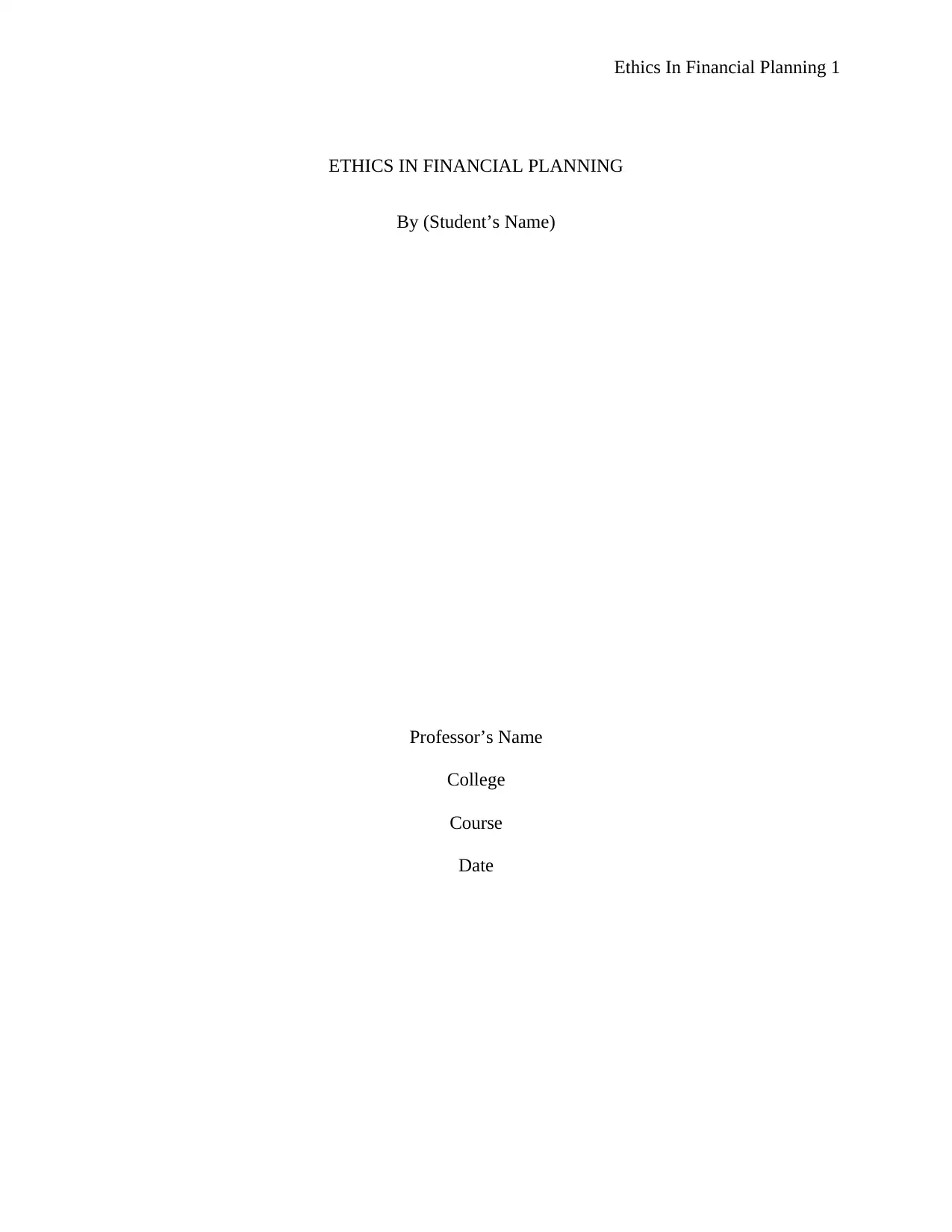
Ethics In Financial Planning 1
ETHICS IN FINANCIAL PLANNING
By (Student’s Name)
Professor’s Name
College
Course
Date
ETHICS IN FINANCIAL PLANNING
By (Student’s Name)
Professor’s Name
College
Course
Date
Paraphrase This Document
Need a fresh take? Get an instant paraphrase of this document with our AI Paraphraser
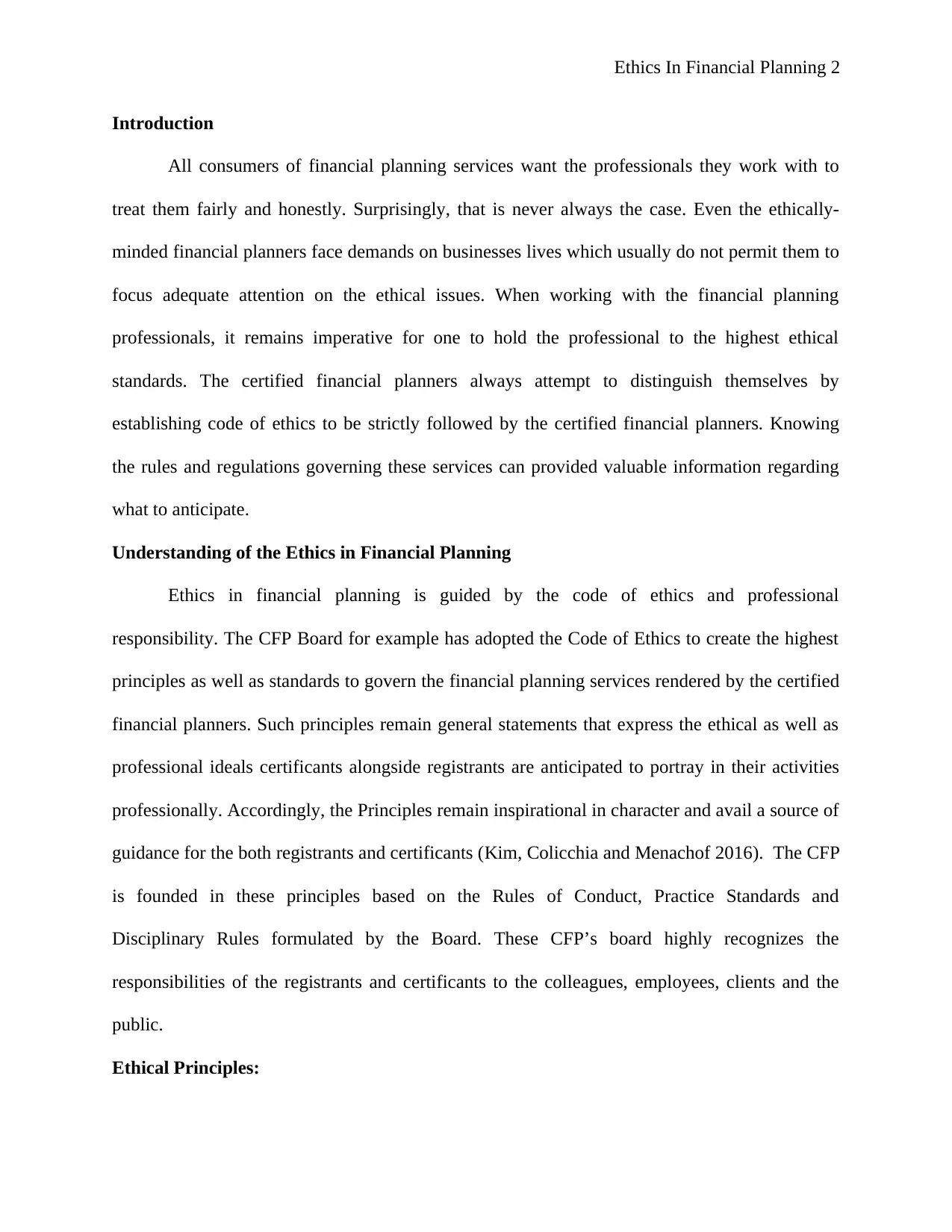
Ethics In Financial Planning 2
Introduction
All consumers of financial planning services want the professionals they work with to
treat them fairly and honestly. Surprisingly, that is never always the case. Even the ethically-
minded financial planners face demands on businesses lives which usually do not permit them to
focus adequate attention on the ethical issues. When working with the financial planning
professionals, it remains imperative for one to hold the professional to the highest ethical
standards. The certified financial planners always attempt to distinguish themselves by
establishing code of ethics to be strictly followed by the certified financial planners. Knowing
the rules and regulations governing these services can provided valuable information regarding
what to anticipate.
Understanding of the Ethics in Financial Planning
Ethics in financial planning is guided by the code of ethics and professional
responsibility. The CFP Board for example has adopted the Code of Ethics to create the highest
principles as well as standards to govern the financial planning services rendered by the certified
financial planners. Such principles remain general statements that express the ethical as well as
professional ideals certificants alongside registrants are anticipated to portray in their activities
professionally. Accordingly, the Principles remain inspirational in character and avail a source of
guidance for the both registrants and certificants (Kim, Colicchia and Menachof 2016). The CFP
is founded in these principles based on the Rules of Conduct, Practice Standards and
Disciplinary Rules formulated by the Board. These CFP’s board highly recognizes the
responsibilities of the registrants and certificants to the colleagues, employees, clients and the
public.
Ethical Principles:
Introduction
All consumers of financial planning services want the professionals they work with to
treat them fairly and honestly. Surprisingly, that is never always the case. Even the ethically-
minded financial planners face demands on businesses lives which usually do not permit them to
focus adequate attention on the ethical issues. When working with the financial planning
professionals, it remains imperative for one to hold the professional to the highest ethical
standards. The certified financial planners always attempt to distinguish themselves by
establishing code of ethics to be strictly followed by the certified financial planners. Knowing
the rules and regulations governing these services can provided valuable information regarding
what to anticipate.
Understanding of the Ethics in Financial Planning
Ethics in financial planning is guided by the code of ethics and professional
responsibility. The CFP Board for example has adopted the Code of Ethics to create the highest
principles as well as standards to govern the financial planning services rendered by the certified
financial planners. Such principles remain general statements that express the ethical as well as
professional ideals certificants alongside registrants are anticipated to portray in their activities
professionally. Accordingly, the Principles remain inspirational in character and avail a source of
guidance for the both registrants and certificants (Kim, Colicchia and Menachof 2016). The CFP
is founded in these principles based on the Rules of Conduct, Practice Standards and
Disciplinary Rules formulated by the Board. These CFP’s board highly recognizes the
responsibilities of the registrants and certificants to the colleagues, employees, clients and the
public.
Ethical Principles:
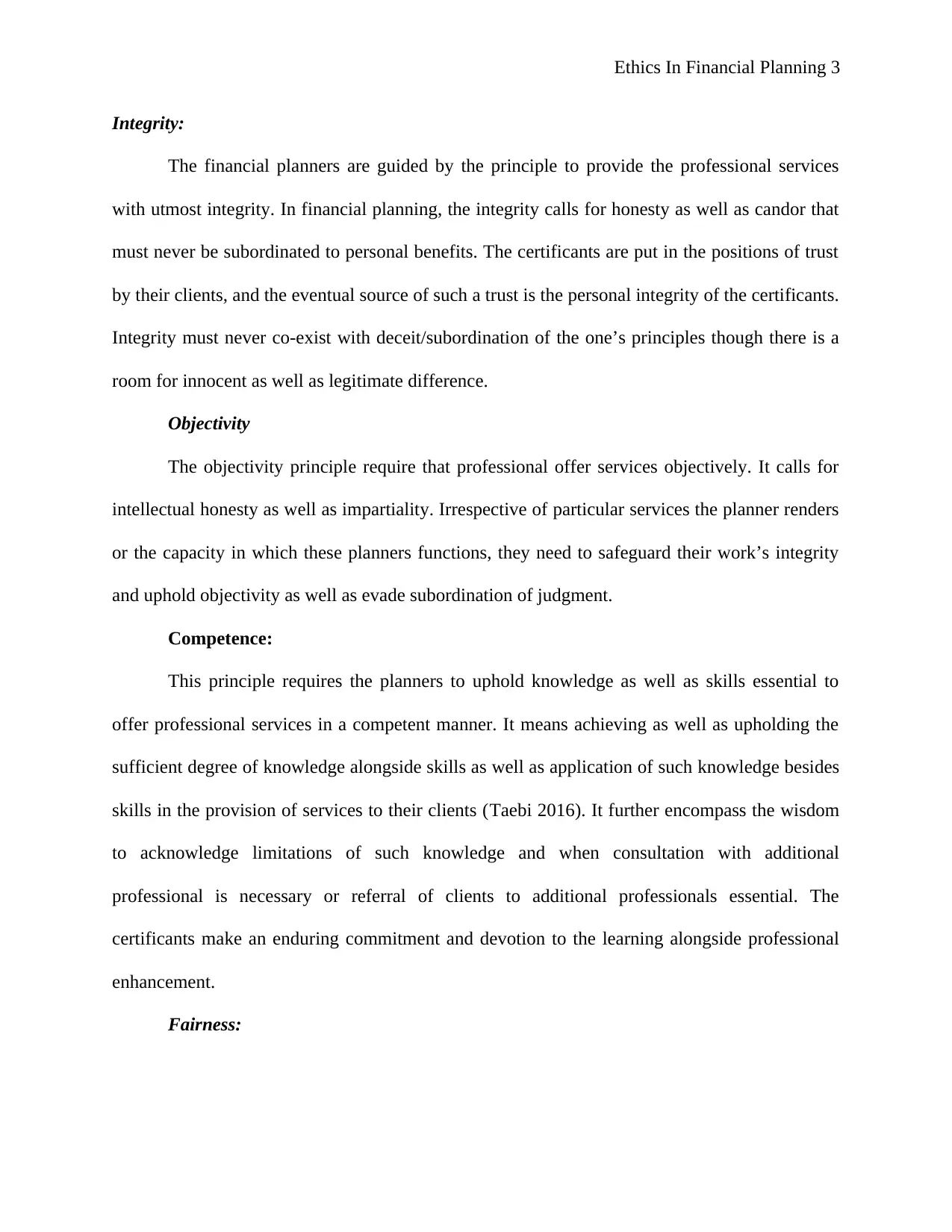
Ethics In Financial Planning 3
Integrity:
The financial planners are guided by the principle to provide the professional services
with utmost integrity. In financial planning, the integrity calls for honesty as well as candor that
must never be subordinated to personal benefits. The certificants are put in the positions of trust
by their clients, and the eventual source of such a trust is the personal integrity of the certificants.
Integrity must never co-exist with deceit/subordination of the one’s principles though there is a
room for innocent as well as legitimate difference.
Objectivity
The objectivity principle require that professional offer services objectively. It calls for
intellectual honesty as well as impartiality. Irrespective of particular services the planner renders
or the capacity in which these planners functions, they need to safeguard their work’s integrity
and uphold objectivity as well as evade subordination of judgment.
Competence:
This principle requires the planners to uphold knowledge as well as skills essential to
offer professional services in a competent manner. It means achieving as well as upholding the
sufficient degree of knowledge alongside skills as well as application of such knowledge besides
skills in the provision of services to their clients (Taebi 2016). It further encompass the wisdom
to acknowledge limitations of such knowledge and when consultation with additional
professional is necessary or referral of clients to additional professionals essential. The
certificants make an enduring commitment and devotion to the learning alongside professional
enhancement.
Fairness:
Integrity:
The financial planners are guided by the principle to provide the professional services
with utmost integrity. In financial planning, the integrity calls for honesty as well as candor that
must never be subordinated to personal benefits. The certificants are put in the positions of trust
by their clients, and the eventual source of such a trust is the personal integrity of the certificants.
Integrity must never co-exist with deceit/subordination of the one’s principles though there is a
room for innocent as well as legitimate difference.
Objectivity
The objectivity principle require that professional offer services objectively. It calls for
intellectual honesty as well as impartiality. Irrespective of particular services the planner renders
or the capacity in which these planners functions, they need to safeguard their work’s integrity
and uphold objectivity as well as evade subordination of judgment.
Competence:
This principle requires the planners to uphold knowledge as well as skills essential to
offer professional services in a competent manner. It means achieving as well as upholding the
sufficient degree of knowledge alongside skills as well as application of such knowledge besides
skills in the provision of services to their clients (Taebi 2016). It further encompass the wisdom
to acknowledge limitations of such knowledge and when consultation with additional
professional is necessary or referral of clients to additional professionals essential. The
certificants make an enduring commitment and devotion to the learning alongside professional
enhancement.
Fairness:
⊘ This is a preview!⊘
Do you want full access?
Subscribe today to unlock all pages.

Trusted by 1+ million students worldwide
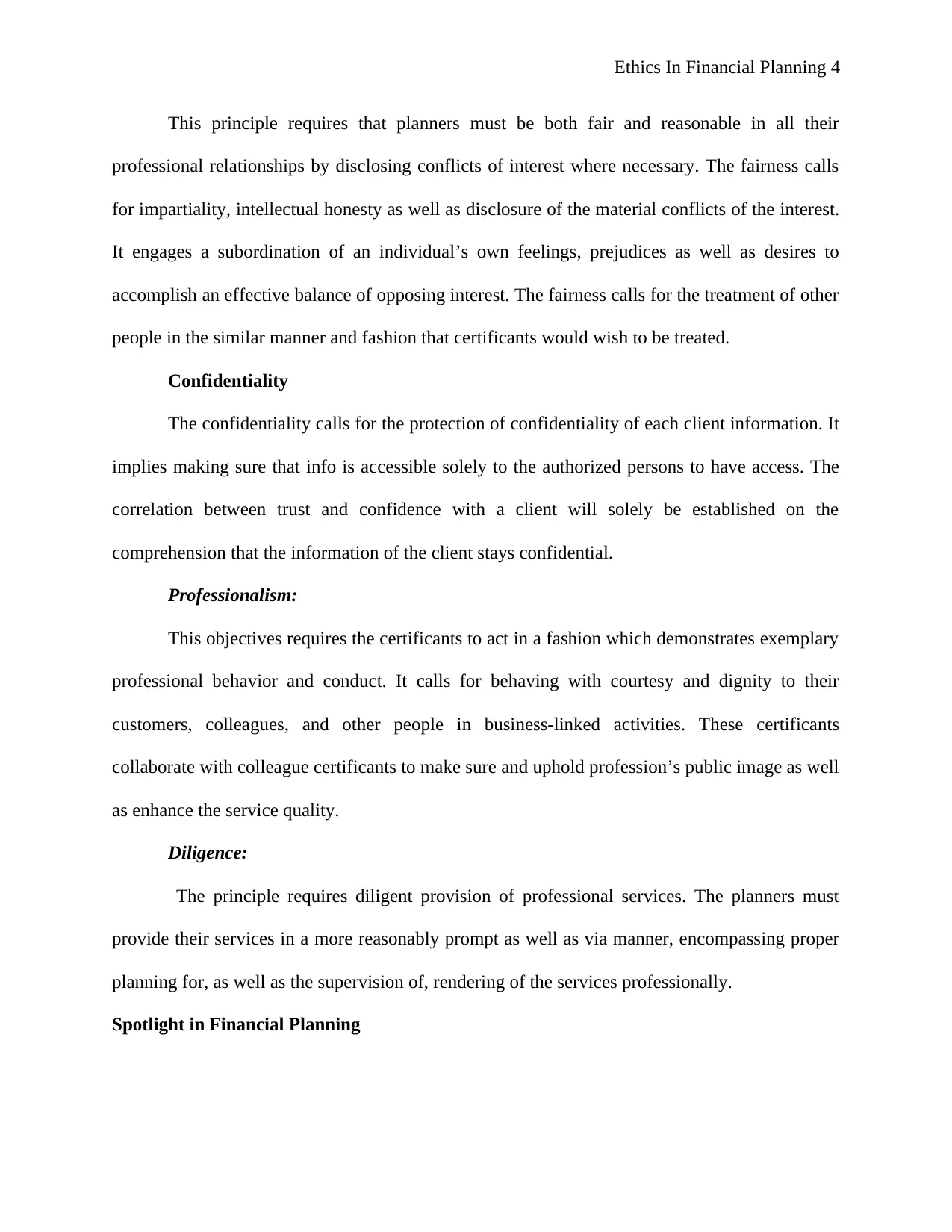
Ethics In Financial Planning 4
This principle requires that planners must be both fair and reasonable in all their
professional relationships by disclosing conflicts of interest where necessary. The fairness calls
for impartiality, intellectual honesty as well as disclosure of the material conflicts of the interest.
It engages a subordination of an individual’s own feelings, prejudices as well as desires to
accomplish an effective balance of opposing interest. The fairness calls for the treatment of other
people in the similar manner and fashion that certificants would wish to be treated.
Confidentiality
The confidentiality calls for the protection of confidentiality of each client information. It
implies making sure that info is accessible solely to the authorized persons to have access. The
correlation between trust and confidence with a client will solely be established on the
comprehension that the information of the client stays confidential.
Professionalism:
This objectives requires the certificants to act in a fashion which demonstrates exemplary
professional behavior and conduct. It calls for behaving with courtesy and dignity to their
customers, colleagues, and other people in business-linked activities. These certificants
collaborate with colleague certificants to make sure and uphold profession’s public image as well
as enhance the service quality.
Diligence:
The principle requires diligent provision of professional services. The planners must
provide their services in a more reasonably prompt as well as via manner, encompassing proper
planning for, as well as the supervision of, rendering of the services professionally.
Spotlight in Financial Planning
This principle requires that planners must be both fair and reasonable in all their
professional relationships by disclosing conflicts of interest where necessary. The fairness calls
for impartiality, intellectual honesty as well as disclosure of the material conflicts of the interest.
It engages a subordination of an individual’s own feelings, prejudices as well as desires to
accomplish an effective balance of opposing interest. The fairness calls for the treatment of other
people in the similar manner and fashion that certificants would wish to be treated.
Confidentiality
The confidentiality calls for the protection of confidentiality of each client information. It
implies making sure that info is accessible solely to the authorized persons to have access. The
correlation between trust and confidence with a client will solely be established on the
comprehension that the information of the client stays confidential.
Professionalism:
This objectives requires the certificants to act in a fashion which demonstrates exemplary
professional behavior and conduct. It calls for behaving with courtesy and dignity to their
customers, colleagues, and other people in business-linked activities. These certificants
collaborate with colleague certificants to make sure and uphold profession’s public image as well
as enhance the service quality.
Diligence:
The principle requires diligent provision of professional services. The planners must
provide their services in a more reasonably prompt as well as via manner, encompassing proper
planning for, as well as the supervision of, rendering of the services professionally.
Spotlight in Financial Planning
Paraphrase This Document
Need a fresh take? Get an instant paraphrase of this document with our AI Paraphraser
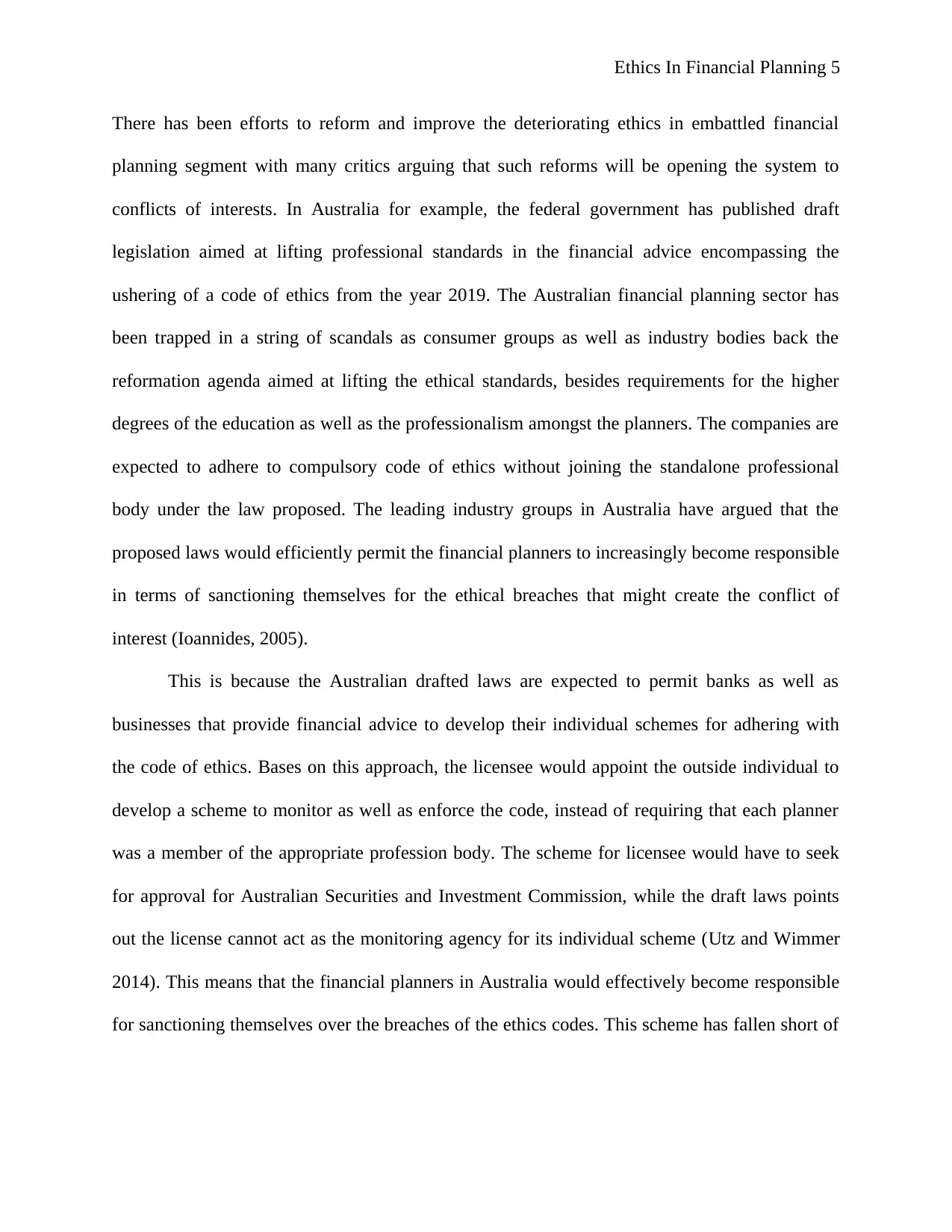
Ethics In Financial Planning 5
There has been efforts to reform and improve the deteriorating ethics in embattled financial
planning segment with many critics arguing that such reforms will be opening the system to
conflicts of interests. In Australia for example, the federal government has published draft
legislation aimed at lifting professional standards in the financial advice encompassing the
ushering of a code of ethics from the year 2019. The Australian financial planning sector has
been trapped in a string of scandals as consumer groups as well as industry bodies back the
reformation agenda aimed at lifting the ethical standards, besides requirements for the higher
degrees of the education as well as the professionalism amongst the planners. The companies are
expected to adhere to compulsory code of ethics without joining the standalone professional
body under the law proposed. The leading industry groups in Australia have argued that the
proposed laws would efficiently permit the financial planners to increasingly become responsible
in terms of sanctioning themselves for the ethical breaches that might create the conflict of
interest (Ioannides, 2005).
This is because the Australian drafted laws are expected to permit banks as well as
businesses that provide financial advice to develop their individual schemes for adhering with
the code of ethics. Bases on this approach, the licensee would appoint the outside individual to
develop a scheme to monitor as well as enforce the code, instead of requiring that each planner
was a member of the appropriate profession body. The scheme for licensee would have to seek
for approval for Australian Securities and Investment Commission, while the draft laws points
out the license cannot act as the monitoring agency for its individual scheme (Utz and Wimmer
2014). This means that the financial planners in Australia would effectively become responsible
for sanctioning themselves over the breaches of the ethics codes. This scheme has fallen short of
There has been efforts to reform and improve the deteriorating ethics in embattled financial
planning segment with many critics arguing that such reforms will be opening the system to
conflicts of interests. In Australia for example, the federal government has published draft
legislation aimed at lifting professional standards in the financial advice encompassing the
ushering of a code of ethics from the year 2019. The Australian financial planning sector has
been trapped in a string of scandals as consumer groups as well as industry bodies back the
reformation agenda aimed at lifting the ethical standards, besides requirements for the higher
degrees of the education as well as the professionalism amongst the planners. The companies are
expected to adhere to compulsory code of ethics without joining the standalone professional
body under the law proposed. The leading industry groups in Australia have argued that the
proposed laws would efficiently permit the financial planners to increasingly become responsible
in terms of sanctioning themselves for the ethical breaches that might create the conflict of
interest (Ioannides, 2005).
This is because the Australian drafted laws are expected to permit banks as well as
businesses that provide financial advice to develop their individual schemes for adhering with
the code of ethics. Bases on this approach, the licensee would appoint the outside individual to
develop a scheme to monitor as well as enforce the code, instead of requiring that each planner
was a member of the appropriate profession body. The scheme for licensee would have to seek
for approval for Australian Securities and Investment Commission, while the draft laws points
out the license cannot act as the monitoring agency for its individual scheme (Utz and Wimmer
2014). This means that the financial planners in Australia would effectively become responsible
for sanctioning themselves over the breaches of the ethics codes. This scheme has fallen short of
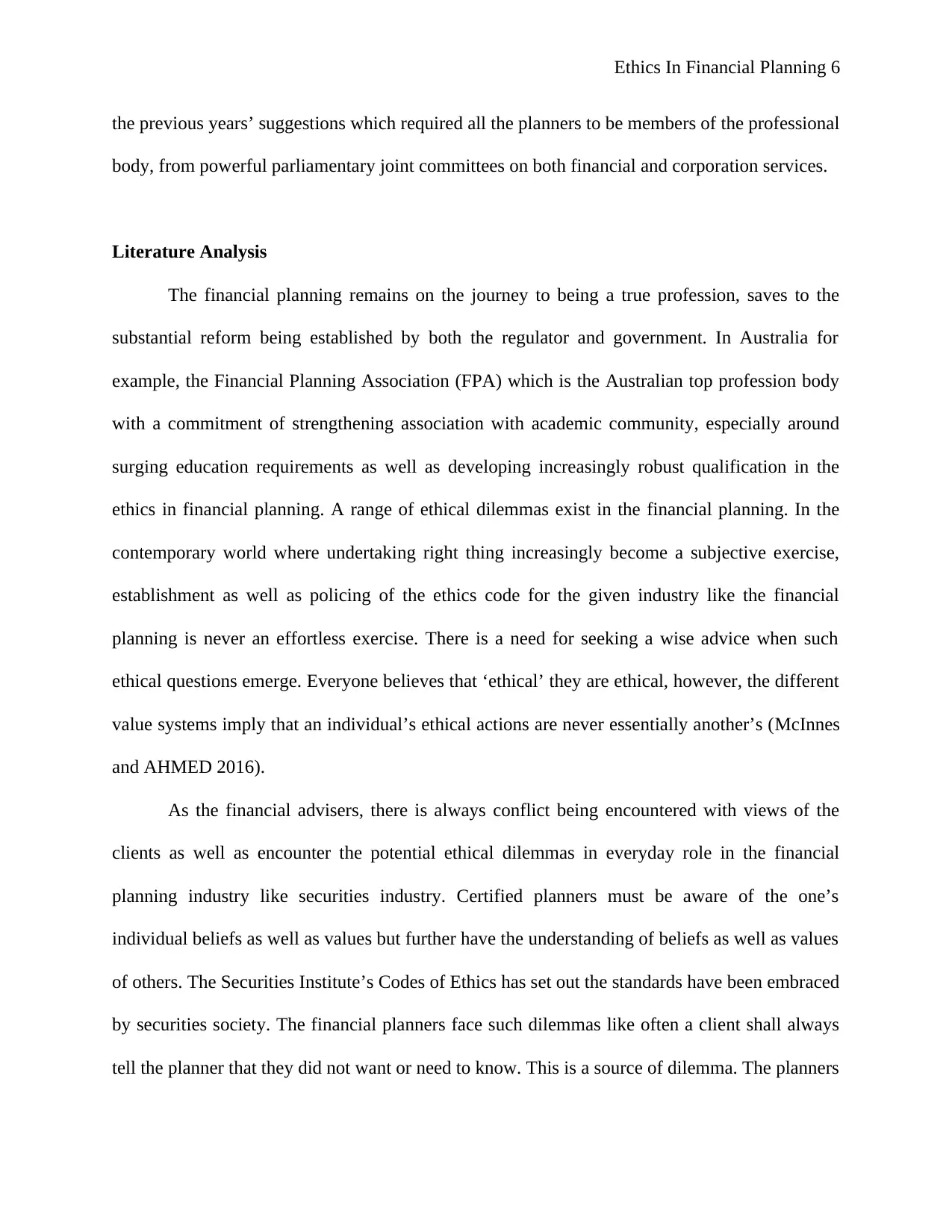
Ethics In Financial Planning 6
the previous years’ suggestions which required all the planners to be members of the professional
body, from powerful parliamentary joint committees on both financial and corporation services.
Literature Analysis
The financial planning remains on the journey to being a true profession, saves to the
substantial reform being established by both the regulator and government. In Australia for
example, the Financial Planning Association (FPA) which is the Australian top profession body
with a commitment of strengthening association with academic community, especially around
surging education requirements as well as developing increasingly robust qualification in the
ethics in financial planning. A range of ethical dilemmas exist in the financial planning. In the
contemporary world where undertaking right thing increasingly become a subjective exercise,
establishment as well as policing of the ethics code for the given industry like the financial
planning is never an effortless exercise. There is a need for seeking a wise advice when such
ethical questions emerge. Everyone believes that ‘ethical’ they are ethical, however, the different
value systems imply that an individual’s ethical actions are never essentially another’s (McInnes
and AHMED 2016).
As the financial advisers, there is always conflict being encountered with views of the
clients as well as encounter the potential ethical dilemmas in everyday role in the financial
planning industry like securities industry. Certified planners must be aware of the one’s
individual beliefs as well as values but further have the understanding of beliefs as well as values
of others. The Securities Institute’s Codes of Ethics has set out the standards have been embraced
by securities society. The financial planners face such dilemmas like often a client shall always
tell the planner that they did not want or need to know. This is a source of dilemma. The planners
the previous years’ suggestions which required all the planners to be members of the professional
body, from powerful parliamentary joint committees on both financial and corporation services.
Literature Analysis
The financial planning remains on the journey to being a true profession, saves to the
substantial reform being established by both the regulator and government. In Australia for
example, the Financial Planning Association (FPA) which is the Australian top profession body
with a commitment of strengthening association with academic community, especially around
surging education requirements as well as developing increasingly robust qualification in the
ethics in financial planning. A range of ethical dilemmas exist in the financial planning. In the
contemporary world where undertaking right thing increasingly become a subjective exercise,
establishment as well as policing of the ethics code for the given industry like the financial
planning is never an effortless exercise. There is a need for seeking a wise advice when such
ethical questions emerge. Everyone believes that ‘ethical’ they are ethical, however, the different
value systems imply that an individual’s ethical actions are never essentially another’s (McInnes
and AHMED 2016).
As the financial advisers, there is always conflict being encountered with views of the
clients as well as encounter the potential ethical dilemmas in everyday role in the financial
planning industry like securities industry. Certified planners must be aware of the one’s
individual beliefs as well as values but further have the understanding of beliefs as well as values
of others. The Securities Institute’s Codes of Ethics has set out the standards have been embraced
by securities society. The financial planners face such dilemmas like often a client shall always
tell the planner that they did not want or need to know. This is a source of dilemma. The planners
⊘ This is a preview!⊘
Do you want full access?
Subscribe today to unlock all pages.

Trusted by 1+ million students worldwide
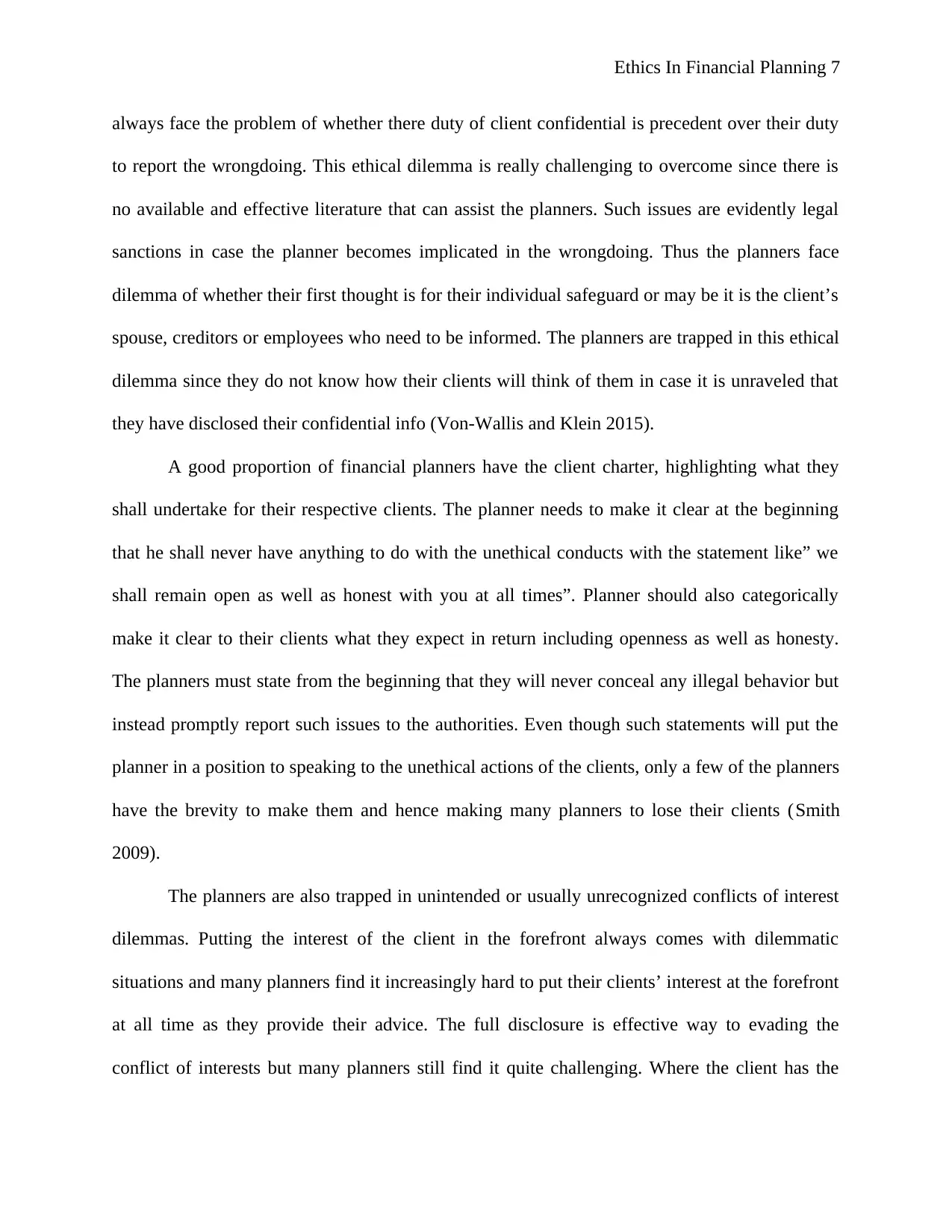
Ethics In Financial Planning 7
always face the problem of whether there duty of client confidential is precedent over their duty
to report the wrongdoing. This ethical dilemma is really challenging to overcome since there is
no available and effective literature that can assist the planners. Such issues are evidently legal
sanctions in case the planner becomes implicated in the wrongdoing. Thus the planners face
dilemma of whether their first thought is for their individual safeguard or may be it is the client’s
spouse, creditors or employees who need to be informed. The planners are trapped in this ethical
dilemma since they do not know how their clients will think of them in case it is unraveled that
they have disclosed their confidential info (Von-Wallis and Klein 2015).
A good proportion of financial planners have the client charter, highlighting what they
shall undertake for their respective clients. The planner needs to make it clear at the beginning
that he shall never have anything to do with the unethical conducts with the statement like” we
shall remain open as well as honest with you at all times”. Planner should also categorically
make it clear to their clients what they expect in return including openness as well as honesty.
The planners must state from the beginning that they will never conceal any illegal behavior but
instead promptly report such issues to the authorities. Even though such statements will put the
planner in a position to speaking to the unethical actions of the clients, only a few of the planners
have the brevity to make them and hence making many planners to lose their clients (Smith
2009).
The planners are also trapped in unintended or usually unrecognized conflicts of interest
dilemmas. Putting the interest of the client in the forefront always comes with dilemmatic
situations and many planners find it increasingly hard to put their clients’ interest at the forefront
at all time as they provide their advice. The full disclosure is effective way to evading the
conflict of interests but many planners still find it quite challenging. Where the client has the
always face the problem of whether there duty of client confidential is precedent over their duty
to report the wrongdoing. This ethical dilemma is really challenging to overcome since there is
no available and effective literature that can assist the planners. Such issues are evidently legal
sanctions in case the planner becomes implicated in the wrongdoing. Thus the planners face
dilemma of whether their first thought is for their individual safeguard or may be it is the client’s
spouse, creditors or employees who need to be informed. The planners are trapped in this ethical
dilemma since they do not know how their clients will think of them in case it is unraveled that
they have disclosed their confidential info (Von-Wallis and Klein 2015).
A good proportion of financial planners have the client charter, highlighting what they
shall undertake for their respective clients. The planner needs to make it clear at the beginning
that he shall never have anything to do with the unethical conducts with the statement like” we
shall remain open as well as honest with you at all times”. Planner should also categorically
make it clear to their clients what they expect in return including openness as well as honesty.
The planners must state from the beginning that they will never conceal any illegal behavior but
instead promptly report such issues to the authorities. Even though such statements will put the
planner in a position to speaking to the unethical actions of the clients, only a few of the planners
have the brevity to make them and hence making many planners to lose their clients (Smith
2009).
The planners are also trapped in unintended or usually unrecognized conflicts of interest
dilemmas. Putting the interest of the client in the forefront always comes with dilemmatic
situations and many planners find it increasingly hard to put their clients’ interest at the forefront
at all time as they provide their advice. The full disclosure is effective way to evading the
conflict of interests but many planners still find it quite challenging. Where the client has the
Paraphrase This Document
Need a fresh take? Get an instant paraphrase of this document with our AI Paraphraser
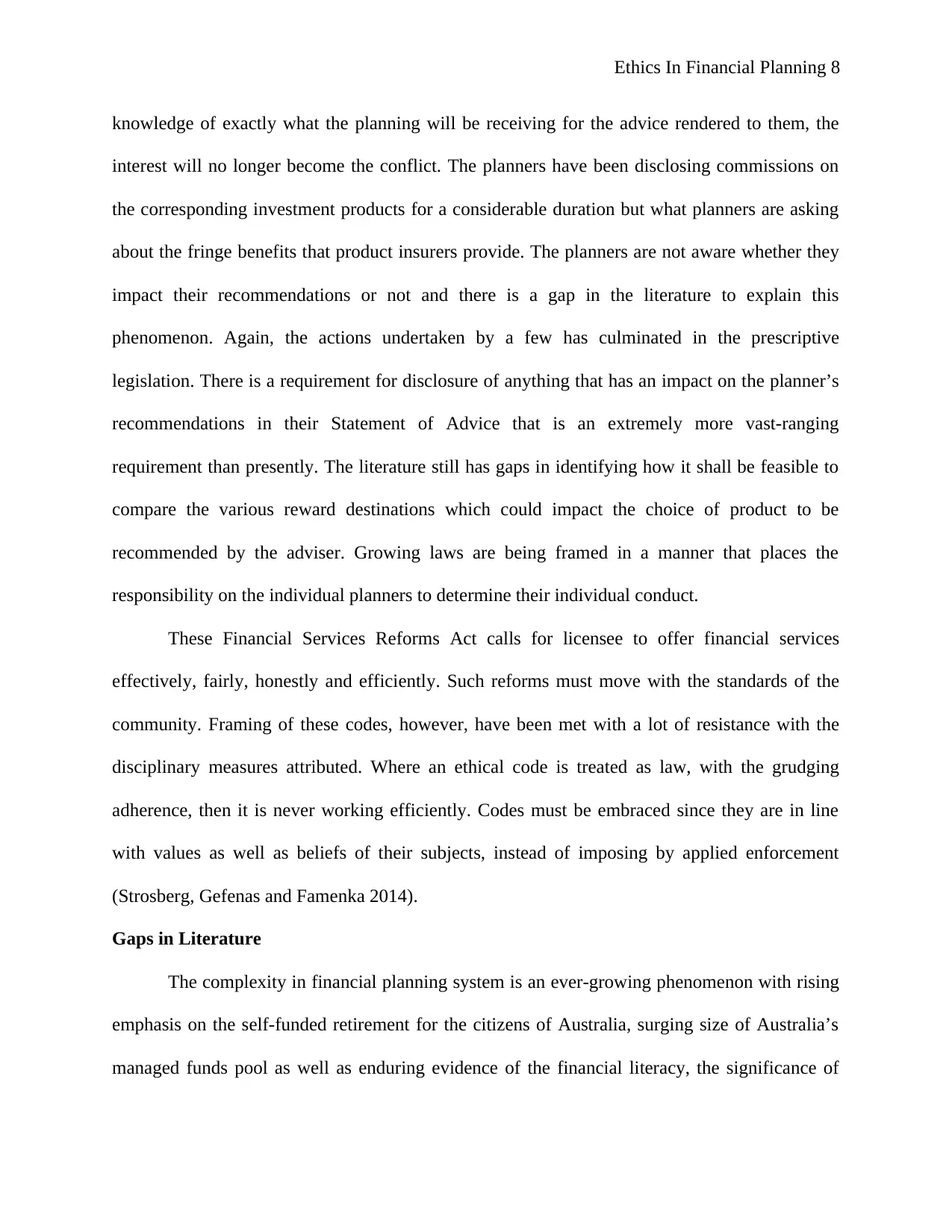
Ethics In Financial Planning 8
knowledge of exactly what the planning will be receiving for the advice rendered to them, the
interest will no longer become the conflict. The planners have been disclosing commissions on
the corresponding investment products for a considerable duration but what planners are asking
about the fringe benefits that product insurers provide. The planners are not aware whether they
impact their recommendations or not and there is a gap in the literature to explain this
phenomenon. Again, the actions undertaken by a few has culminated in the prescriptive
legislation. There is a requirement for disclosure of anything that has an impact on the planner’s
recommendations in their Statement of Advice that is an extremely more vast-ranging
requirement than presently. The literature still has gaps in identifying how it shall be feasible to
compare the various reward destinations which could impact the choice of product to be
recommended by the adviser. Growing laws are being framed in a manner that places the
responsibility on the individual planners to determine their individual conduct.
These Financial Services Reforms Act calls for licensee to offer financial services
effectively, fairly, honestly and efficiently. Such reforms must move with the standards of the
community. Framing of these codes, however, have been met with a lot of resistance with the
disciplinary measures attributed. Where an ethical code is treated as law, with the grudging
adherence, then it is never working efficiently. Codes must be embraced since they are in line
with values as well as beliefs of their subjects, instead of imposing by applied enforcement
(Strosberg, Gefenas and Famenka 2014).
Gaps in Literature
The complexity in financial planning system is an ever-growing phenomenon with rising
emphasis on the self-funded retirement for the citizens of Australia, surging size of Australia’s
managed funds pool as well as enduring evidence of the financial literacy, the significance of
knowledge of exactly what the planning will be receiving for the advice rendered to them, the
interest will no longer become the conflict. The planners have been disclosing commissions on
the corresponding investment products for a considerable duration but what planners are asking
about the fringe benefits that product insurers provide. The planners are not aware whether they
impact their recommendations or not and there is a gap in the literature to explain this
phenomenon. Again, the actions undertaken by a few has culminated in the prescriptive
legislation. There is a requirement for disclosure of anything that has an impact on the planner’s
recommendations in their Statement of Advice that is an extremely more vast-ranging
requirement than presently. The literature still has gaps in identifying how it shall be feasible to
compare the various reward destinations which could impact the choice of product to be
recommended by the adviser. Growing laws are being framed in a manner that places the
responsibility on the individual planners to determine their individual conduct.
These Financial Services Reforms Act calls for licensee to offer financial services
effectively, fairly, honestly and efficiently. Such reforms must move with the standards of the
community. Framing of these codes, however, have been met with a lot of resistance with the
disciplinary measures attributed. Where an ethical code is treated as law, with the grudging
adherence, then it is never working efficiently. Codes must be embraced since they are in line
with values as well as beliefs of their subjects, instead of imposing by applied enforcement
(Strosberg, Gefenas and Famenka 2014).
Gaps in Literature
The complexity in financial planning system is an ever-growing phenomenon with rising
emphasis on the self-funded retirement for the citizens of Australia, surging size of Australia’s
managed funds pool as well as enduring evidence of the financial literacy, the significance of
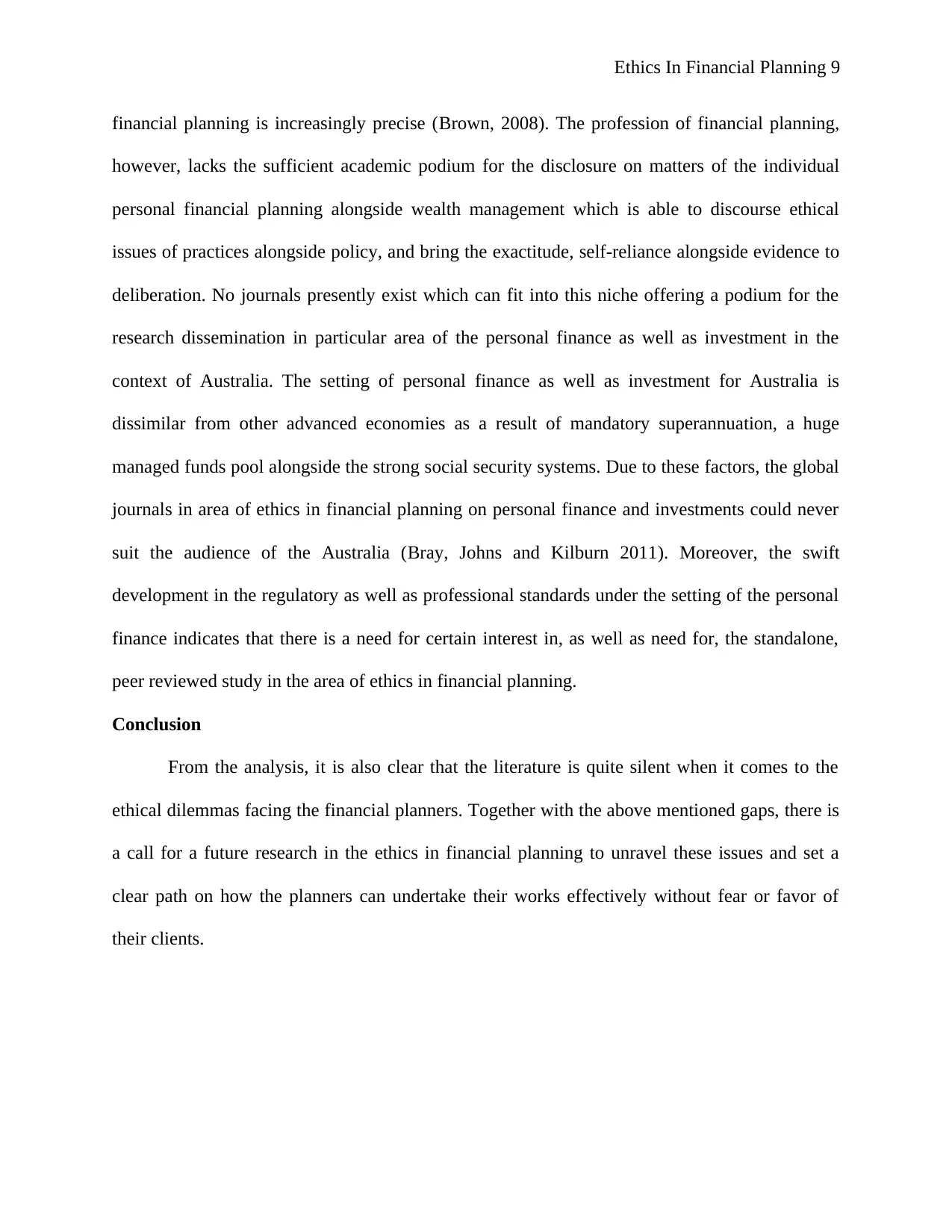
Ethics In Financial Planning 9
financial planning is increasingly precise (Brown, 2008). The profession of financial planning,
however, lacks the sufficient academic podium for the disclosure on matters of the individual
personal financial planning alongside wealth management which is able to discourse ethical
issues of practices alongside policy, and bring the exactitude, self-reliance alongside evidence to
deliberation. No journals presently exist which can fit into this niche offering a podium for the
research dissemination in particular area of the personal finance as well as investment in the
context of Australia. The setting of personal finance as well as investment for Australia is
dissimilar from other advanced economies as a result of mandatory superannuation, a huge
managed funds pool alongside the strong social security systems. Due to these factors, the global
journals in area of ethics in financial planning on personal finance and investments could never
suit the audience of the Australia (Bray, Johns and Kilburn 2011). Moreover, the swift
development in the regulatory as well as professional standards under the setting of the personal
finance indicates that there is a need for certain interest in, as well as need for, the standalone,
peer reviewed study in the area of ethics in financial planning.
Conclusion
From the analysis, it is also clear that the literature is quite silent when it comes to the
ethical dilemmas facing the financial planners. Together with the above mentioned gaps, there is
a call for a future research in the ethics in financial planning to unravel these issues and set a
clear path on how the planners can undertake their works effectively without fear or favor of
their clients.
financial planning is increasingly precise (Brown, 2008). The profession of financial planning,
however, lacks the sufficient academic podium for the disclosure on matters of the individual
personal financial planning alongside wealth management which is able to discourse ethical
issues of practices alongside policy, and bring the exactitude, self-reliance alongside evidence to
deliberation. No journals presently exist which can fit into this niche offering a podium for the
research dissemination in particular area of the personal finance as well as investment in the
context of Australia. The setting of personal finance as well as investment for Australia is
dissimilar from other advanced economies as a result of mandatory superannuation, a huge
managed funds pool alongside the strong social security systems. Due to these factors, the global
journals in area of ethics in financial planning on personal finance and investments could never
suit the audience of the Australia (Bray, Johns and Kilburn 2011). Moreover, the swift
development in the regulatory as well as professional standards under the setting of the personal
finance indicates that there is a need for certain interest in, as well as need for, the standalone,
peer reviewed study in the area of ethics in financial planning.
Conclusion
From the analysis, it is also clear that the literature is quite silent when it comes to the
ethical dilemmas facing the financial planners. Together with the above mentioned gaps, there is
a call for a future research in the ethics in financial planning to unravel these issues and set a
clear path on how the planners can undertake their works effectively without fear or favor of
their clients.
⊘ This is a preview!⊘
Do you want full access?
Subscribe today to unlock all pages.

Trusted by 1+ million students worldwide
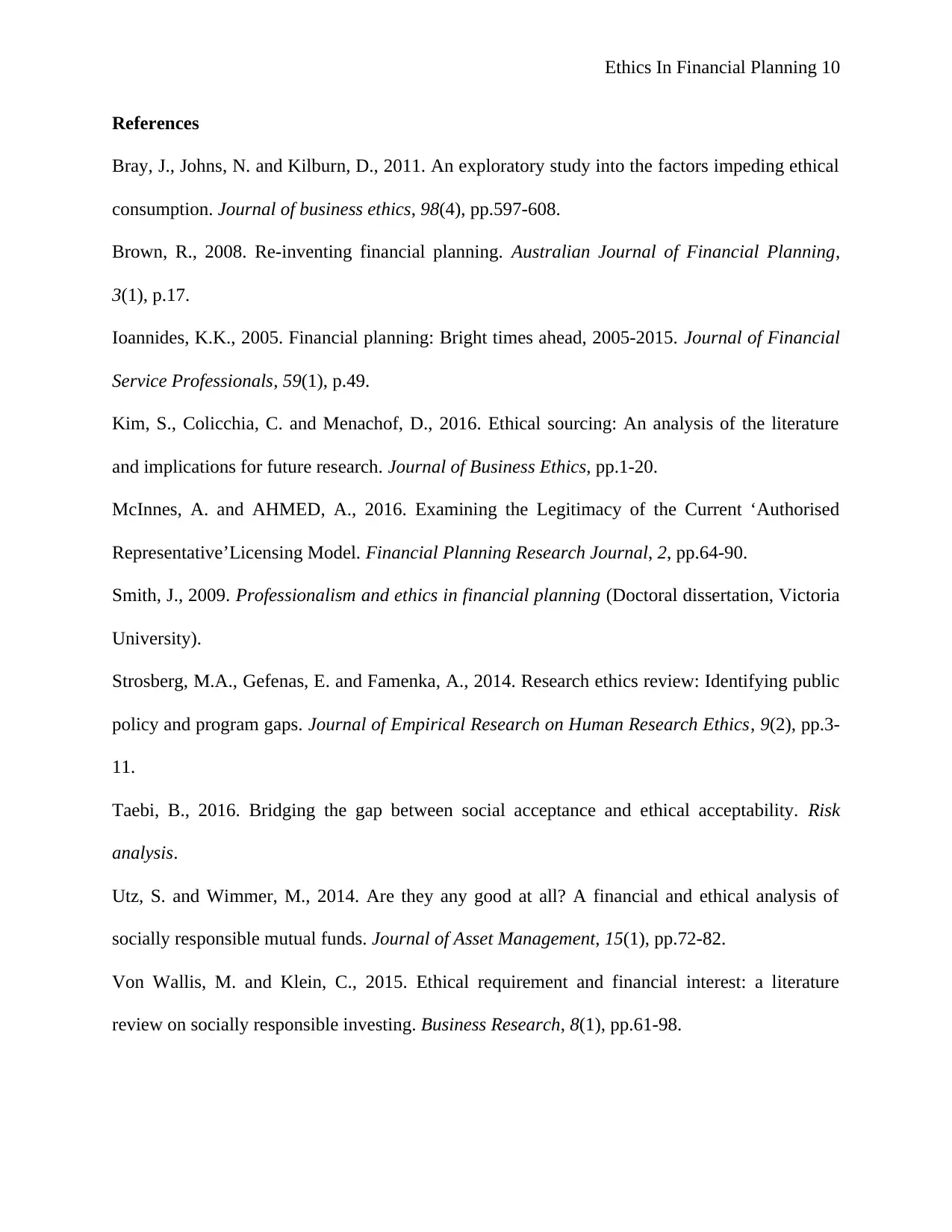
Ethics In Financial Planning 10
References
Bray, J., Johns, N. and Kilburn, D., 2011. An exploratory study into the factors impeding ethical
consumption. Journal of business ethics, 98(4), pp.597-608.
Brown, R., 2008. Re-inventing financial planning. Australian Journal of Financial Planning,
3(1), p.17.
Ioannides, K.K., 2005. Financial planning: Bright times ahead, 2005-2015. Journal of Financial
Service Professionals, 59(1), p.49.
Kim, S., Colicchia, C. and Menachof, D., 2016. Ethical sourcing: An analysis of the literature
and implications for future research. Journal of Business Ethics, pp.1-20.
McInnes, A. and AHMED, A., 2016. Examining the Legitimacy of the Current ‘Authorised
Representative’Licensing Model. Financial Planning Research Journal, 2, pp.64-90.
Smith, J., 2009. Professionalism and ethics in financial planning (Doctoral dissertation, Victoria
University).
Strosberg, M.A., Gefenas, E. and Famenka, A., 2014. Research ethics review: Identifying public
policy and program gaps. Journal of Empirical Research on Human Research Ethics, 9(2), pp.3-
11.
Taebi, B., 2016. Bridging the gap between social acceptance and ethical acceptability. Risk
analysis.
Utz, S. and Wimmer, M., 2014. Are they any good at all? A financial and ethical analysis of
socially responsible mutual funds. Journal of Asset Management, 15(1), pp.72-82.
Von Wallis, M. and Klein, C., 2015. Ethical requirement and financial interest: a literature
review on socially responsible investing. Business Research, 8(1), pp.61-98.
References
Bray, J., Johns, N. and Kilburn, D., 2011. An exploratory study into the factors impeding ethical
consumption. Journal of business ethics, 98(4), pp.597-608.
Brown, R., 2008. Re-inventing financial planning. Australian Journal of Financial Planning,
3(1), p.17.
Ioannides, K.K., 2005. Financial planning: Bright times ahead, 2005-2015. Journal of Financial
Service Professionals, 59(1), p.49.
Kim, S., Colicchia, C. and Menachof, D., 2016. Ethical sourcing: An analysis of the literature
and implications for future research. Journal of Business Ethics, pp.1-20.
McInnes, A. and AHMED, A., 2016. Examining the Legitimacy of the Current ‘Authorised
Representative’Licensing Model. Financial Planning Research Journal, 2, pp.64-90.
Smith, J., 2009. Professionalism and ethics in financial planning (Doctoral dissertation, Victoria
University).
Strosberg, M.A., Gefenas, E. and Famenka, A., 2014. Research ethics review: Identifying public
policy and program gaps. Journal of Empirical Research on Human Research Ethics, 9(2), pp.3-
11.
Taebi, B., 2016. Bridging the gap between social acceptance and ethical acceptability. Risk
analysis.
Utz, S. and Wimmer, M., 2014. Are they any good at all? A financial and ethical analysis of
socially responsible mutual funds. Journal of Asset Management, 15(1), pp.72-82.
Von Wallis, M. and Klein, C., 2015. Ethical requirement and financial interest: a literature
review on socially responsible investing. Business Research, 8(1), pp.61-98.
1 out of 10
Related Documents
Your All-in-One AI-Powered Toolkit for Academic Success.
+13062052269
info@desklib.com
Available 24*7 on WhatsApp / Email
![[object Object]](/_next/static/media/star-bottom.7253800d.svg)
Unlock your academic potential
Copyright © 2020–2026 A2Z Services. All Rights Reserved. Developed and managed by ZUCOL.





